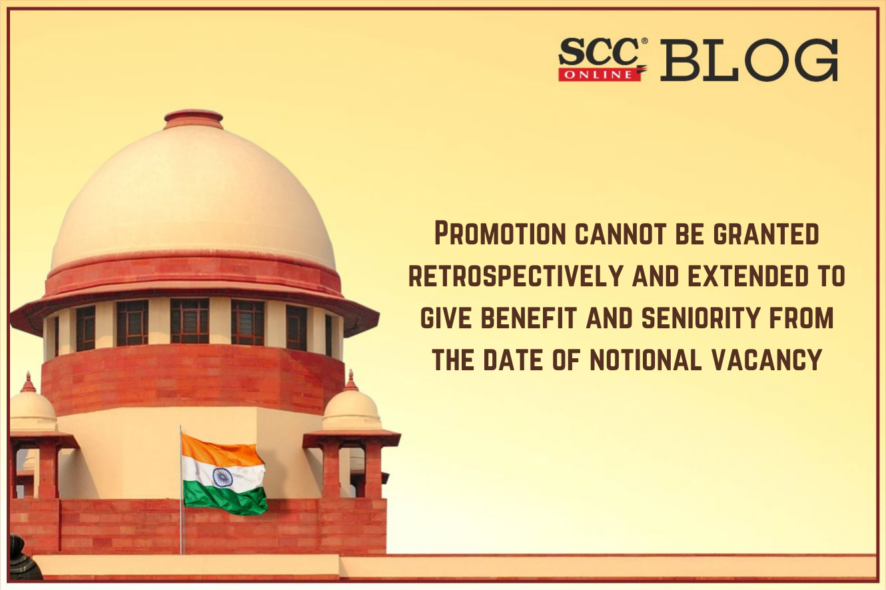Supreme Court: The bench of Sanjay Kishan Kaul and MM Sundresh*, JJ has observed that a right to promotion and subsequent benefits and seniority would arise only with respect to the rules governing the said promotion, and not a different set of rules which might apply to a promoted post facilitating further promotion which is governed by a different set of rules.
The Court was deciding a case where the actual vacancy in Junior Administrative Grade – I (JAG-I) accrued in 2011, however, the respondents sought retrospective promotion from 2009. Both the respondents before the Court worked with the appellant holding the post of Junior Administrative Grade-II. While one voluntarily retired in the year 2010 ( CASE NO. 1), the second one was appointed to JAG-I service on an ad hoc basis only on 27.12.2011 after being placed in the select list against a notional vacancy in 2009 (CASE NO. 2).
JAG-I a promotional post or mere upgradation of JAG-II?
The Court disagreed with the High Court’s view that JAG-I is a mere upgradation of JAG-II and explained,
“Differential pay scale along with a process of selection qua suitability fixing eligibility criteria are the factors to determine whether a particular post is the same as the other or a promotional one. We feel that such an exercise is not required since the rules themselves are specific. When the rules are specific and clear, there is no need for interpretation which may lead to a case of judicial legislation.”
Hence, the post of JAG-I is certainly a promotional post from the feeder cadre of the JAG-II.
Right to retrospective promotion
The Court made clear that a mere existence of vacancy per se will not create a right in favour of an employee for retrospective promotion when the vacancies in the promotional post is specifically prescribed under the rules, which also mandate the clearance through a selection process. It is also to be borne in mind that when we deal with a case of promotion, there can never be a parity between two separate sets of rules. In other words, a right to promotion and subsequent benefits and seniority would arise only with respect to the rules governing the said promotion, and not a different set of rules which might apply to a promoted post facilitating further promotion which is governed by a different set of rules.
CASE No. 1
Holding that a voluntary retiree cannot seek promotion as a matter of right sans rules governing, the Court observed that it is trite law that once an officer retires voluntarily, there is cessation of jural relationship resorting to a “golden handshake” between the employer and employee. Such a former employee cannot seek to agitate his past, as well as future rights, if any, sans the prescription of rules. This would include the enhanced pay scale.
Hence, the first Respondent was rightly not considered in the Departmental Promotion Committee (DPC) in 2012 since he was no longer in service at the relevant point of time. Hence, the High Court has committed an error in relying upon a circular, which has got no application at all, particularly in the light of our finding that we are dealing with a case of promotion simpliciter as against upgradation of any nature.
CASE No. 1
Explaining the provisions under the National Capital Territory of Delhi, Andaman and Nicobar Islands, Lakshadweep, Daman and Diu and Dadra and Nagar Haveli (Civil Service) Rules, 2003, the Court said that as there is no vested or accrued right over a promotional post, in the absence of any vacancies actually in existence for the year 2009, the migration of the other officers of the Indian Administrative Service (IAS) cadre took place only in the year 2011. Thus, the embargo brought forth by Rule 4 and 7 of the 2003 Rules would not facilitate such a relief. Under the Indian Administrative Service (Appointment by promotion) Regulations 1954, and IAS (Regulations of Seniority Rules, 1987, Officers inducted into IAS from ‘JAG-I’ get seniority from the date on which vacancy arises, even though induction takes place subject to DPC.
In the present case, there was a delay in holding of DPC for induction of JAG-I officers into IAS, as such actual vacancy in JAG-I occurred in 2011, even though notional vacancy may have arisen in 2009 itself. Since the promotion from JAG-II to JAG-I is governed by the 2003 Rules, which prescribe promotion when actual vacancy arises and DPC takes place, as such, a right would accrue to an officer only after his entry and therefore, mere inclusion in the select list based on induction of JAG-I officers into IAS, is of no consequence. Under the 2003 Rules, a vacancy would mean an actual one and inclusion in the select list to a different cadre governed by different rules would not create a deemed one.
Hence, the second respondent was appointed to JAG-I service on an ad hoc basis only on 27.12.2011 and, therefore, without being inducted in the said cadre, he cannot seek for promotion with retrospective effect. He was given promotion after the successful consideration by the DPC. On such clearance the appellant has rightly fixed the promotion with the year of actual vacancy, as per rules. Thus, the Respondent neither on facts nor on law can claim retrospective promotion, and that too from the year 2009 being the year in which he was placed in the select list against a notional vacancy, especially when the then existing vacancy accrued only in the year 2011, when the JAG-I officers were actually inducted into IAS, against which he was promoted.
“As such, the promotion cannot be granted retrospectively and extended to give benefit and seniority from the date of notional vacancy, causing violence to Rule 4 and 7 of the 2003 Rules.”
[Union of India v. Manpreet Singh Poonam, 2022 SCC OnLine SC 272, decided on 08.03.2022]
*Judgment by: Justice MM Sundresh
Counsels
For appellants: Advocate Rekha Pandey
For Respondent: Advocate Avnish Ahlawat






